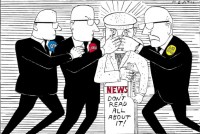 On Wednesday, Jonathan Leigh and Bai Bai Sesay, both editors at the Independent Observer newspaper, were charged with criminal defamation for publishing an article critical of the Sierra Leonean President, Ernest Bai Koroma.
On Wednesday, Jonathan Leigh and Bai Bai Sesay, both editors at the Independent Observer newspaper, were charged with criminal defamation for publishing an article critical of the Sierra Leonean President, Ernest Bai Koroma.
They have already been in detention for six days and have been denied bail pending the resumption of their trial on 29 October.
“Criminal defamation charges against media workers highlight the incredibly worrying climate for freedom of expression in the West African country,” said Lisa Sherman-Nikolaus, Amnesty International’s Researcher on Sierra Leone.
“All charges must be dropped and these two men released immediately and unconditionally. Their detention and criminal charges appear to stem from them peacefully carrying out journalistic work.
“The Sierra Leonean authorities must respect the right to freedom of expression. Legitimate criticism of public officials should never be grounds for curtailing free speech.”
Sierra Leone’s Criminal Investigation Department (CID) confirmed to Amnesty International that the two editors are charged with 26 counts, including “conspiracy to commit acts with seditious intent”. The CID claimed that editors exhibited a “tendency of bringing the name of his Excellency to disrepute and inciting hatred.”
“High-level government officials must be prepared to face public criticism about how they carry out their office. To refuse a space for such criticism and public accountability is a violation of the right to freedom of expression guaranteed by Sierra Leonean and international law,” said Lisa Sherman-Nikolaus.
“The Public Order Act of 1965, which the Sierra Leonean authorities are abusing in this instance, is extremely antiquated. It should be repealed as it does not comply with international human rights obligations.”
It took more than an hour for the charge sheet to be read out in court on 23 October. The defence team had still not been provided with a copy of the charge by the time the hearing concluded.
Following the hearing, advocates for freedom of the press demonstrated outside the court building. Police reportedly pushed protesters aside to allow police vehicles to leave the court compound.
“This is very unfortunate event and reflects a crackdown on media expression. The media has a right to criticize a leader,” Emmanuel Saffa Abdulai, the men’s lawyer, said of the charges.
The Sierra Leone Association of Journalists (SLAJ) sees it as a clear attempt to intimidate journalists.
“These are coordinated attacks on press freedom in Sierra Leone. Police should not regulate the media,” said Abubakarr Bah, an SLAJ spokesperson.
Background
Since the beginning of this week, the CID has also questioned the publishers and editors of other national newspapers over alleged political articles they published. Among the newspapers targeted are The Global Times, The Salone Times,The Premier News and The Concord Times. Several of the publications also had their offices searched by security forces.
At least one freelance journalist has also been called in for questioning about an article he wrote that the CID has alleged amounts to seditious libel.
The Public Order Act of 1965, which the Sierra Leonean authorities are abusing in this instance, is extremely antiquated. Under the Act, anyone who prints, publishes, sells, offers for sale, distributes or reproduces any “seditious” publication can be found guilty of a criminal offence and serve up to a three-year prison sentence.
Amnesty International and other human rights organizations have long been calling for the repeal or amendment of portions of Sierra Leone’s Public Order Act. The Truth and Reconciliation Commission report and the UN have echoed this recommendation.
On 21 July 2011, the UN Human Rights Committee adopted General Comment 34 on States parties’ obligations under Article 19 of the International Covenant on Civil and Political Rights (ICCPR). The General Comment provides guidance to states on what the freedoms of opinion and expression mean in practice, and therefore strengthens the protection provided by international law.
According to the General Comment: “… the mere fact that forms of expression are considered to be insulting to a public figure is not sufficient to justify the imposition of penalties, albeit public figures may also benefit from the provisions of the Covenant. Moreover, all public figures, including those exercising the highest political authority such as heads of state and government, are legitimately subject to criticism and political opposition.”
General Comment 34 also says, “States parties should consider the decriminalization of defamation and … the application of the criminal law should only be countenanced in the most serious of cases and imprisonment is never an appropriate penalty.


Be the first to comment